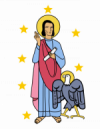Maundy Thursday Reflection
Reflection on the Gospel Reading John 13:1-17, 31b-35
Brothers and Sisters,
Maundy Thursday – What is it
Maundy Thursday, sometimes called Holy Thursday is celebrated the Thursday before Easter. On this day, participants remember Jesus’ last supper with his disciples. During this last supper, Jesus also washed the disciples’ feet.
Maundy Thursday services often include the observance of communion (the Lord’s Supper) and some churches have the washing of feet.
John’s account of the last supper begins with Jesus washing the disciples’ feet.
The action is simple, yet its significance is revolutionary. Using the most ordinary means, Jesus conveys the most extraordinary love and commands his disciples to do the same.
First, note that Jesus is the one who performs the action in 13:1-10. He is the doer, who acts on behalf of his disciples. In the ancient world, people commonly washed their own feet. When guests arrived at someone’s home, feet covered with dust from the road, a good host would offer them a basin of water. The host would not do the washing, but would provide the water so that the guests could wash their own feet. In some cases the host would have a slave wash the feet of the guests. But it was understood that no free person would stoop to wash the feet of another free person. Hospitality meant offering water and perhaps the services of a slave. It did not mean doing the washing.
For a free person to wash someone else’s feet meant that he or she was assuming the position of a slave. The only reason someone would do this voluntarily was to show complete devotion to another person. This is what Jesus does here. He assumes the role of a slave to show the depth of his love for his disciples (13:1). Jesus does not act out of weakness, but out of strength. John tells us that Jesus has come from God and is going to God, and that God has put all things into Jesus’ hands. Yet the one who has all things in his hands now uses his hands to wash feet. His power comes to expression in self-giving love (13:3-5).
What is more, the devil is present and active in the scene, putting betrayal into the heart of Judas (13:2). Yet here the love of Jesus remains unwavering. Jesus does not meet evil on Satan’s terms but on God’s terms–for in the face of betrayal he apparently washes the feet of all the disciples, including those of Judas. The love that Jesus shows here cannot be equated with a feeling of affection. It is the form that divine power takes in the face of sin and evil.
Peter’s sputtering objection to the foot washing is completely understandable. No self-respecting disciple could allow a teacher to act this way toward his pupils (13:6). Yet Jesus insists that he must act in this way, because if anyone is to be in a relationship with him, it will come as a gift–the scandalous gift of divine love (13:8). Peter cannot comprehend this now, but his denial of Jesus later that evening will make clear that if his relationship with Jesus is to have a future, it will have to come as a gift of love from the crucified and risen Jesus.
Second, Jesus tells the disciples that what he has done is not only a gift, but an example. As he has washed their feet, they are to wash one another’s feet (13:12-17). Note
that this command is not given at the beginning of the chapter. Jesus refrains from commanding them to show love to others until after they have received love from him. By washing the feet of others, they are called to share the love they have received from Christ.
The events of Maundy Thursday, therefore, highlights the humility and servanthood of Jesus. His command to his disciples is a command that he leaves for us as well. “A new command I give you: Love one another. As I have loved you, so you must love one another. By this all men will know that you are my disciples, if you love one another” (John 13:34-35).
